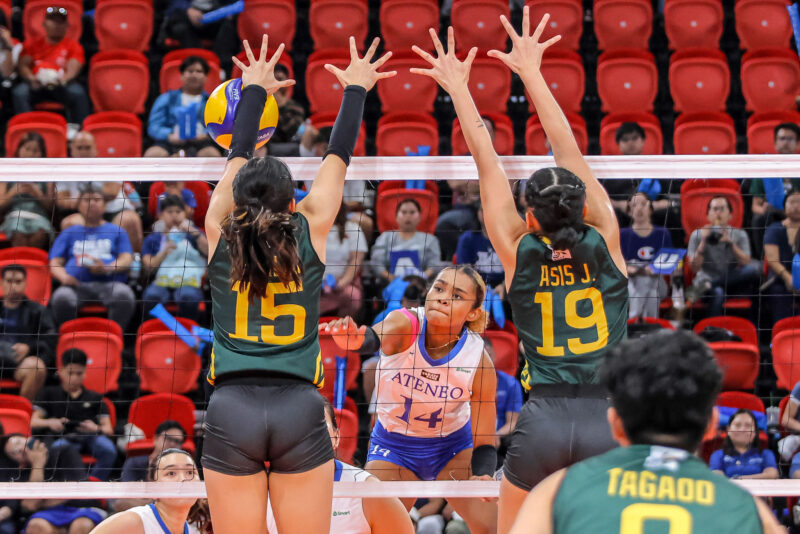TWO ATENEAN alumni pushed students to work towards incorporating social awareness and professional development alongside the effective use of social media in the second day of Thoughtbox 2: Game Changer.
The talks, the second of a two-part series organized by Aiesec Ateneo de Manila University (Aiesec ADMU) in partnership with the Ateneo Management Economics Organization, were held on January 21 at the Ricardo and Dr. Rosita Leong Hall Roof Deck.
The speakers were Marla Miniano (AB IS ‘06), editor-in-chief (EIC) of Candy Magazine and author of food blog Table for Two, and Ernesto Ordoñez (AB EC ‘69), founder of Aiesec ADMU and former Philippine undersecretary for Trade and Industry.
Aiesec ADMU Local Committee Vice President for Marketing Cha Maglalang said that the Thoughtbox series aimed to explore “going outside the traditional [methods and practices] in our different fields and professions.”
Maglalang also added that their speakers were chosen on “how they themselves change the game in their own chosen fields.”
According to Aiesec ADMU Director for Strategic Initiatives Bea Ruiz, Thoughtbox 2 was specifically aimed to “focus more on raising social awareness.”
“In contrast to previous versions of Thoughtbox, such as the one last semester where we focused on the social sector and had a less concrete structure, we wanted this series of talks (Thoughtbox 2) to involve people with full positions from businesses and organizations to speak,” she added.
Ruiz noted that Thoughtbox is a global initiative also organized by other branches of Aiesec across the world, with this series of Thoughtboxes being Aiesec ADMU’s most recent effort at creating a local version.
Social awareness through positive social media
Drawing from her experience as the EIC of a widely-known magazine, Miniano focused on the impact of social media on how people perceive users and the benefits of promoting a positive image on students’ accounts.
She took on students’ preconceptions of positive impacts as just “big actions,” such as actively promoting disaster prevention and poverty alleviation, and raised the idea of having social media users increase their social awareness through small actions, such as posting more positive content.
Miniano said increased social awareness through positive posts in students’ accounts work towards “fostering real communities” on social networks, which have become fertile ground for cyberbullying thanks to the anonymity granted by the Internet.
She referenced several notable social media accounts, such as @TitasOfManila and the Instagram accounts of Reese Fernandez-Ruiz and Rissa Mananquil being examples of positive social media use in terms of spreading culture, art and positive family relations, respectively.
“These social media users show that the Internet is not just for spreading photos of you going out or partying. They can be used to help positively impact both your lives and ours, even if it is just calligraphy on Instagram photos or tweets about family and friends,” Miniano added.
She encouraged students to critically examine how the content they post affects their image online, and to consider the message that it sends and to wonder what the post says about them.
“There’s always room for good things online. Start small, and start with yourself,” she said.
“To find your stars”
Ordoñez focused on how professional development and social awareness were not strictly exclusive concepts, rather, “they [are] integral and essential in this day and age” due to how business expectations have changed to be more people-centric.
“Today, in your business plans and ambitions, you have to carefully consider not just the shareholders and your employees, but you must also take into account the people your product will reach, and the impact you will have on the community at large,” he said.
In terms of professional development, he stressed the importance of always having plans when embarking on huge projects, but also drew attention to the importance of being flexible and “diverting from your plans” when sudden opportunities arise.
“A good plan will get you to your destination, but it is in the journey where the interesting things happen. The things you encounter here may often be greater than what you were looking for in the first place,” he added.
Ordoñez emphasized the need for social awareness to be incorporated in plans for professional development by offering anecdotes from previous jobs.
He commented on how people he worked with before “were too focused on the business side of things” and neglected other important factors to building business, such as helping minorities and engaging in social awareness programs.
He added that students should look both to improve businesses and the community when considering social awareness, and to embark on efforts that will not only improve their product, but also improve how the community functions as a result.
“If you truly want to change the game and think out of the box, you have to do three things: Live serendipitously, take risks and find your heart. It is only then when you can find your stars,” he said.






